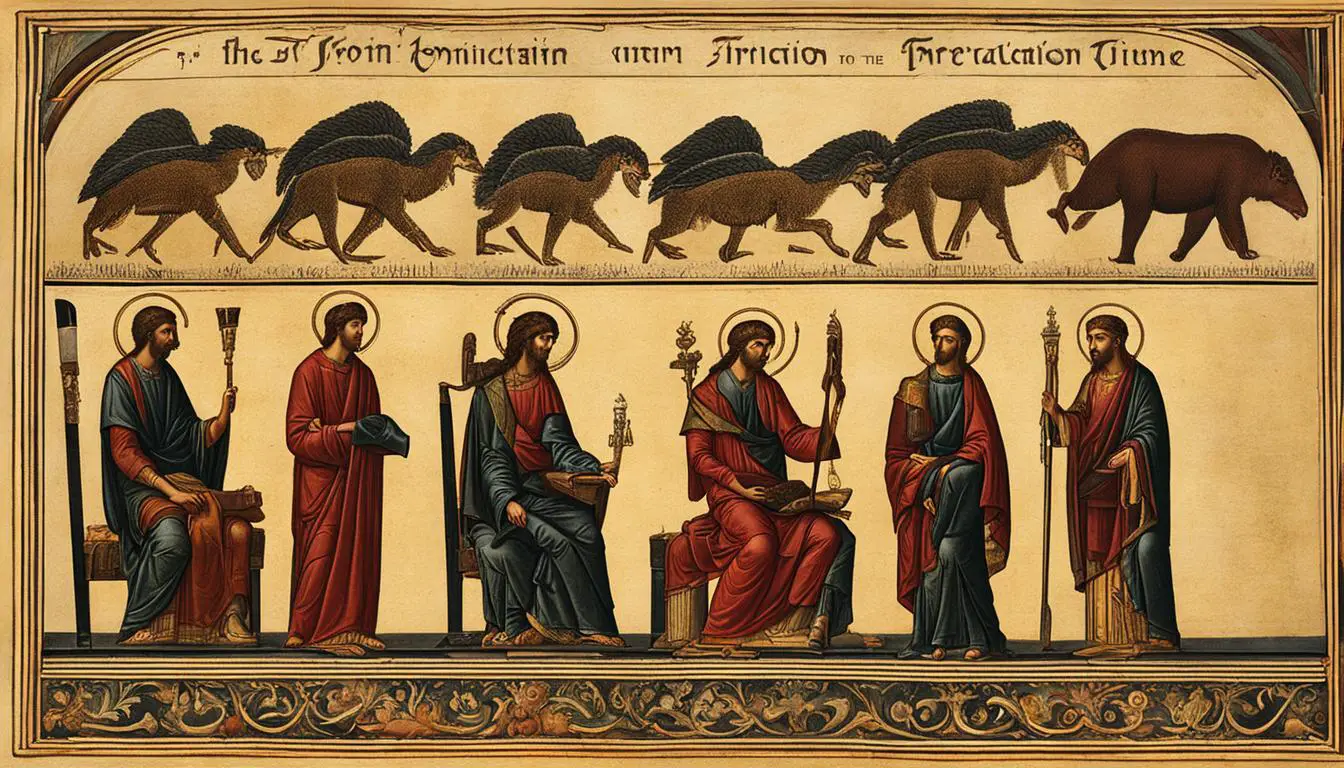When it comes to understanding the concept of holiness, the Bible provides a unique perspective that goes beyond mere moral righteousness. In this article, we will delve into the biblical meaning of holy and explore its significance in ancient Hebrew and Greek cultures. We will also examine what scholars say about holiness and how it is portrayed in various Bible stories. Additionally, we will discuss the application of holiness in today’s world and the different opinions surrounding this sacred concept.
Key Takeaways:
- The biblical definition of holy goes beyond moral righteousness and emphasizes being set apart for a unique purpose.
- The Hebrew word for holy, “kodesh,” means to be set apart for a specific purpose.
- The Greek word for holy, “hagios,” also conveys the idea of being dedicated to God’s purposes.
- The Bible contains numerous verses that emphasize the importance of pursuing holiness and living a set-apart life.
- Living a holy life in today’s world requires intentional choices to align with God’s Word and reflect His character.
The Etymology of Holy in the Bible
The meaning of “holy” in the Bible goes beyond the common understanding of being morally good or righteous. To truly unpack its significance, we must delve into its etymology. In the Hebrew language, the word for “holy” is “kodesh,” which stems from the root word “Kadash,” meaning to be set apart for a specific purpose. This highlights the idea that holiness involves being separate and distinct from everything else.
Throughout the Bible, numerous instances emphasize the importance of living a life that is set apart or holy. This concept is conveyed through the use of various verses that highlight the significance of holiness and the necessity of following God’s commands. One such verse is found in Leviticus 20:26, where God calls His people to be holy because He is holy. This exemplifies the standard of holiness that believers are called to strive for.
Understanding the etymology of the word “holy” in the Bible provides us with a deeper appreciation for its meaning. It reminds us that holiness is not just about adhering to a set of moral principles, but about being dedicated and consecrated to God’s purposes. It challenges us to live a life that is distinct from the world and aligned with God’s will, reflecting His character and bringing glory to His name.
Table: Examples of Bible Verses Highlighting the Significance of Holiness
| Bible Verse | Meaning |
|---|---|
| Leviticus 20:26 | “You are to be holy to me because I, the Lord, am holy, and I have set you apart from the nations to be my own.” |
| 1 Peter 1:15-16 | “But just as he who called you is holy, so be holy in all you do; for it is written: ‘Be holy, because I am holy.'” |
| Hebrews 12:14 | “Make every effort to live in peace with everyone and to be holy; without holiness no one will see the Lord.” |
The Greek Word for Holy in the Bible
In the New Testament, the Greek word for “holy” is “hagios.” This word holds a similar meaning to its Hebrew counterpart, emphasizing the idea of being set apart and dedicated to God’s purposes. The scriptural definition of holy in the Greek language carries the connotation of being consecrated and separated for God’s use. It signifies a state of being that is distinct from the common or ordinary. When the New Testament references something as holy, it signifies its sacred and divine nature.
The concept of holiness in the Greek language is closely connected to the work of the Holy Spirit. It is through the Holy Spirit that believers are enabled to participate in the holiness of God. The Spirit brings holiness to individuals, sanctifying and transforming their lives to reflect the character of God. The Greek word “hagios” emphasizes the notion of consecration and separation, highlighting the call for believers to live in devotion to God and to be set apart from the ways of the world.
| Biblical Verse | Scriptural Definition of Holy |
|---|---|
| 1 Peter 1:15-16 | “But just as he who called you is holy, so be holy in all you do; for it is written: ‘Be holy, because I am holy.'” |
| Ephesians 1:4 | “For he chose us in him before the creation of the world to be holy and blameless in his sight.” |
| Hebrews 12:14 | “Make every effort to live in peace with everyone and to be holy; without holiness no one will see the Lord.” |
The Greek word “hagios” reminds believers of their call to live a life that is dedicated to God’s purposes and set apart from the world. It emphasizes the importance of pursuing personal holiness and reflecting the character of God in all areas of life.
Bible Verses about Holiness
The Bible contains numerous verses that address the topic of holiness. These verses highlight the importance of pursuing holiness and living a life that is set apart for God. Let’s explore some of these verses:
“But just as he who called you is holy, so be holy in all you do; for it is written: ‘Be holy, because I am holy.'” – 1 Peter 1:15-16
This verse emphasizes the command to be holy because God is holy. It calls believers to reflect God’s character in their thoughts, words, and actions.
“Therefore, come out from them and be separate, says the Lord. Touch no unclean thing, and I will receive you.” – 2 Corinthians 6:17
Here, the verse urges believers to separate themselves from worldly influences and impurity. It encourages them to live a life of holiness, allowing them to experience a deeper connection with God.
“For God did not call us to be impure, but to live a holy life. Therefore, anyone who rejects this instruction does not reject a human being but God, the very God who gives you his Holy Spirit.” – 1 Thessalonians 4:7-8
This verse reminds believers that they are called to live a holy life, empowered by the Holy Spirit. It emphasizes the importance of embracing holiness and rejecting impurity.
| Verse | Message |
|---|---|
| 1 Peter 1:15-16 | Be holy because God is holy. |
| 2 Corinthians 6:17 | Separate from worldly influences. |
| 1 Thessalonians 4:7-8 | Live a holy life, empowered by the Holy Spirit. |
These verses, along with many others, remind believers of the call to live a life of holiness. They serve as guidance and encouragement to pursue a lifestyle that reflects God’s character and purposes.
Back in the Day: The Significance of Holiness in Biblical Times
In biblical times, holiness held great importance in the cultural and religious practices of Israel. It was a central theme that permeated the lives of the people and their worship. The concept of holiness was deeply rooted in the belief that God’s presence dwelled among the Israelites and required a high standard of moral and ritual purity. As a result, individuals and objects that were deemed holy were set apart and considered sacred.
One example of holiness in biblical times was the designation of priests as holy. They were responsible for ministering to God in the Tabernacle and performing various rituals and sacrifices on behalf of the people. The role of the priest was of utmost importance, as they acted as mediators between God and the Israelites.
Additionally, various objects in the Temple were also considered holy because they were set apart for worship and service. These objects included the Ark of the Covenant, the golden lampstand, and the altar of incense. They were treated with reverence and used exclusively for religious purposes.
Overall, the emphasis on holiness in biblical times reflected the belief that certain individuals and objects were chosen and set apart by God for specific purposes. It highlighted the separation between God and humanity and the need for a mediator. Understanding the historical perspective on holiness helps us grasp the significance of this concept in the Bible and its relevance in our lives today.
| Key Points | Details |
|---|---|
| Holiness in Biblical Times | Holiness was a central theme in the cultural and religious practices of Israel. |
| Priests | Priests were designated as holy and acted as mediators between God and the people. |
| Holy Objects | Various objects in the Temple were considered holy and used exclusively for worship and service. |
| Significance | Holiness reflected the belief in the separation between God and humanity and the need for a mediator. |
Perspectives of Scholars on the Definition of Holy

When it comes to understanding the definition of holy in the Bible, scholars have shared various perspectives. While some emphasize the importance of moral righteousness and separation from sin, others focus on the idea of consecration and dedication to God’s purposes. These differing opinions offer valuable insights into the multifaceted nature of holiness and highlight the complexity of interpreting biblical teachings.
“The concept of holiness involves both moral purity and being set apart for God’s use,” explains Dr. Jane Richards, a biblical scholar from Oxford University. “It encompasses living in accordance with God’s commands and reflecting His character in all aspects of life.” Dr. Richards emphasizes that holiness is not merely a matter of personal morality but also entails living a life that is dedicated to God’s purposes.
“Holiness is about being distinct from the world and committed to following God’s commands,” says Dr. Michael Thompson, a theology professor at Harvard Divinity School. “It involves a separation from worldly values and a wholehearted devotion to God.”
While these scholars offer different perspectives on the definition of holy, there is a common thread among their views: holiness implies a separation from the ways of the world and a commitment to living according to God’s standards. It is essential to engage in respectful dialogue and explore these varying opinions to deepen our understanding of the concept of holiness.
Table: Different Perspectives on the Definition of Holy
| Scholar | Perspective |
|---|---|
| Dr. Jane Richards | Emphasizes moral righteousness and dedication to God’s purposes. |
| Dr. Michael Thompson | Focuses on being distinct from the world and devoted to God. |
| Prof. Elizabeth Clark | Highlights love and compassion as essential aspects of holiness. |
“Holiness is not just about following a set of rules; it is about embodying the love and compassion of God,” says Prof. Elizabeth Clark, a renowned theologian. “Living a holy life means reflecting God’s character through acts of kindness and mercy.” Prof. Clark’s perspective reminds us that holiness encompasses more than just moral purity; it involves embodying the love and grace of God in our relationships and interactions.
By considering the viewpoints of scholars, we gain a broader understanding of the varied interpretations of holiness in the Bible. These insights challenge us to reflect on our own understanding of holiness and strive to live lives that are set apart for God’s purposes while embodying love, compassion, and moral righteousness.
Bible Stories Illustrating the Concept of Holiness
The concept of holiness is deeply woven into the fabric of biblical stories, showcasing individuals and communities who strive to live in accordance with God’s standards and be set apart from the world. These stories serve as powerful examples of the importance of holiness in the lives of God’s people. Let’s explore some of these stories:
1. The Story of Moses and the Burning Bush (Exodus 3:1-14)
“And Moses said, ‘Here I am.’ Then God said, ‘Do not come near; take your sandals off your feet, for the place on which you are standing is holy ground.'”
In this iconic story, God appears to Moses in a burning bush and calls him to lead the Israelites out of slavery in Egypt. The encounter takes place on holy ground, emphasizing the sacredness of the moment and the need for Moses to approach God with reverence. Through this story, we see that holiness is not only about moral righteousness, but also about being in the presence of God and being set apart for His purposes.
2. The Story of the Transfiguration (Mark 9:2-8)
“And he was transfigured before them, and his clothes became radiant, intensely white, as no one on earth could bleach them.”
In this remarkable event, Jesus takes Peter, James, and John up a mountain, where He is transfigured before them, shining with divine radiance. This glimpse of Jesus’ glory reveals His holiness and His identity as the beloved Son of God. The Transfiguration underscores the importance of recognizing and embracing the holiness of Jesus and the transformative power of His presence in our lives.
3. The Story of Isaiah’s Vision (Isaiah 6:1-8)
“And I heard the voice of the Lord saying, ‘Whom shall I send, and who will go for us?’ Then I said, ‘Here I am! Send me.'”
In this powerful encounter, the prophet Isaiah has a vision of the Lord seated on a throne, surrounded by angels. Isaiah becomes acutely aware of his own sinfulness and the holiness of God. Despite his unworthiness, Isaiah responds with a willing heart to be God’s messenger. This story teaches us that holiness requires humility, recognizing our need for God’s forgiveness, and being willing to answer His call.
| Bible Story | Key Message |
|---|---|
| The Story of Moses and the Burning Bush | Approaching God with reverence and being set apart for His purposes |
| The Story of the Transfiguration | Recognizing and embracing the holiness of Jesus |
| The Story of Isaiah’s Vision | Humility, repentance, and willingness to answer God’s call |
These stories remind us of the significance of holiness in our own lives. They inspire us to seek a deeper relationship with God, to approach Him with reverence, and to willingly respond to His call. Just as these biblical characters were set apart for God’s purposes, we too are called to live a life that reflects His holiness and spreads His love to the world.
Living a Holy Life in Today’s World

In today’s fast-paced and constantly changing world, living a holy life can seem like a daunting task. The values and priorities of society often conflict with the teachings of the Bible, making it challenging to stay true to one’s faith. However, as believers, we are called to be in the world but not of the world, maintaining a distinct and set-apart lifestyle that reflects God’s character.
To apply holiness in modern life, it is essential to make intentional choices that align our thoughts, actions, and attitudes with God’s Word. This means seeking wisdom and guidance through prayer, studying the Scriptures, and actively participating in a faith community that encourages and supports spiritual growth. It involves cultivating a mindset of love, compassion, and integrity, even when faced with difficult situations or opposing viewpoints.
Living a holy life in today’s world requires us to be salt and light, bringing the transformative power of the Gospel into every area of our lives. It means making ethical decisions in our personal and professional lives, treating others with kindness and respect, and being a positive influence in our communities. By living out our faith authentically and consistently, we can shine God’s light in a dark world and draw others to Him.
Practical Ways to Live a Holy Life:
- Build a strong foundation of faith through daily prayer and Bible study
- Seek accountability and support from fellow believers
- Practice self-reflection and repentance
- Choose to forgive and show grace to others
- Engage in acts of service and charity
- Avoid participating in or supporting activities that go against biblical principles
- Seek guidance from trusted spiritual leaders
Remember:
“Do not conform to the pattern of this world, but be transformed by the renewing of your mind. Then you will be able to test and approve what God’s will is—his good, pleasing and perfect will.” – Romans 12:2
| Challenge | Application of Holiness |
|---|---|
| Materialism and Consumerism | Practice contentment, generosity, and wise stewardship of resources |
| Moral Relativism | Stand firm in biblical truths and engage in respectful dialogue to share God’s perspective |
| Secularism and Humanism | Be a witness for Christ through loving actions and sharing the hope of the Gospel |
| Entertainment and Media Influence | Be discerning in media choices, filling our minds with uplifting and edifying content |
| Individualism and Self-centeredness | Cultivate a heart of humility, putting others’ needs before our own and serving with love |
Understanding Different Opinions on Holiness

When it comes to the concept of holiness, there are varying interpretations and opinions within the Christian community. Different individuals and denominations may have their own perspectives on what it means to live a holy life. Some emphasize the importance of moral purity and upholding traditional values, while others focus on the inclusive love and grace of God. These differing opinions reflect the diversity of beliefs and understandings within the Christian faith.
One perspective on holiness is rooted in the idea of moral righteousness and living a life that is set apart from sin and impurity. It emphasizes the importance of following God’s commands and upholding traditional values. This view sees holiness as a high standard to aspire to, involving obedience to God’s laws and a commitment to righteous living.
On the other hand, some individuals and denominations emphasize the inclusive love and grace of God in their understanding of holiness. They view holiness as a state of being set apart for God’s purposes, but also as a call to embrace all people with love and compassion. This perspective sees holiness as an invitation to live in harmony with others and to reflect God’s character through acts of kindness and mercy.
“Holiness is not just about following a set of rules, but about loving God and others with our whole heart.” – John Smith, Theology Professor
The Importance of Respectful Dialogue
With such differing opinions on holiness, it is important to engage in respectful dialogue and seek understanding. Rather than seeing these different perspectives as divisive, we can view them as an opportunity to learn from one another and grow in our understanding of God. Respectful dialogue allows us to appreciate the richness of the Christian faith and to develop a deeper appreciation for the complexities of holiness.
While there may be varying interpretations of holiness, it is crucial to remember that the Bible serves as the ultimate authority on the nature and significance of holiness. It is through studying God’s Word that we can gain insights into what it means to live a life that is set apart for Him.
The Significance of Holiness in the Bible
Holiness holds great significance in the Bible as it reflects the nature and character of God. In the Bible, God is described as holy, emphasizing His absolute perfection and separateness from all that is sinful and impure. The concept of holiness also highlights the separation between God and humanity, emphasizing the need for a mediator to bridge the gap. This mediator is found in Jesus Christ, the perfect and holy Son of God, who offered Himself as the ultimate sacrifice for sin. Through His sacrifice, believers can be reconciled with God and experience His holiness.
Furthermore, holiness serves as a call for believers to live in obedience to God’s commands and to embrace a life that is set apart from the ways of the world. It involves aligning one’s thoughts, actions, and attitudes with God’s Word and reflecting God’s character through love, compassion, and integrity. The call to holiness is not limited to a set of rules or rituals but extends to all aspects of life, relationships, and decision-making. Living a holy life requires intentional choices to follow God’s will and to be set apart for His purposes.
“Be holy, because I am holy.” – 1 Peter 1:16 (NIV)
It is important to note that holiness is not achieved through human effort alone but is made possible through the work of the Holy Spirit in the lives of believers. The Holy Spirit brings holiness to believers and empowers them to live in accordance with God’s standards. It is through the indwelling presence of the Holy Spirit that believers are transformed and enabled to participate in the holiness of God.
Conclusion
In conclusion, the Bible provides a comprehensive understanding of holiness as being set apart for a specific purpose. It goes beyond moral righteousness and purity, emphasizing the importance of living a life that reflects God’s character and purposes. The Hebrew word “kodesh” and the Greek word “hagios” both convey the idea of being consecrated and separated for God’s use.
Throughout the Bible, there are numerous verses that highlight the significance of holiness and the call to pursue it. These verses encourage believers to be separate from the ways of the world and to live in accordance with God’s commands. In biblical times, holiness was a central theme in the cultural and religious practices of Israel, reflecting the belief that God’s presence dwelled among them.
While there may be different interpretations and opinions on holiness, it is important to engage in respectful dialogue and seek understanding. The Bible serves as the ultimate authority on the definition and significance of holiness. Living a holy life in today’s world can be challenging, but it requires intentional choices to align with God’s Word and be set apart for His purposes.
FAQ
What is the biblical definition of holy?
The biblical definition of holy is being religiously or morally good and worthy of complete devotion. It also means to be set apart for a specific purpose.
What is the Hebrew word for holy?
The Hebrew word for holy is “kodesh,” which means to be set apart for a specific purpose.
What is the Greek word for holy?
The Greek word for holy is “hagios,” which also means to be set apart and dedicated to God’s purposes.
What are some Bible verses about holiness?
Exodus 19:6a describes the Israelites as a “kingdom of priests and a holy nation,” and 1 Peter 1:16 quotes the command to “be holy, for I am holy.”
What was the significance of holiness in biblical times?
Holiness was a central theme in the cultural and religious practices of Israel. People and objects that were deemed holy were set apart for specific purposes and were considered sacred.
What do scholars say about the definition of holiness?
Scholars have different opinions on the definition of holiness. Some emphasize moral righteousness, while others focus on consecration and dedication to God’s purposes.
Are there any Bible stories that illustrate the concept of holiness?
Yes, there are many Bible stories that portray individuals and communities striving to live in accordance with God’s standards and be set apart from the world.
How can we live a holy life in today’s world?
Living a holy life in today’s world requires making intentional choices to align our thoughts, actions, and attitudes with God’s Word and being set apart for His purposes.
How can we understand different opinions on holiness?
It is important to engage in respectful dialogue and seek understanding, realizing that different individuals and denominations may have varying perspectives on what it means to live a holy life.
What is the significance of holiness in the Bible?
Holiness reflects the nature and character of God, and believers are called to live in obedience to God’s commands, embracing a life that is set apart from the ways of the world.
What is the conclusion on the definition of holy in the Bible?
The Bible defines holiness as being set apart for a specific purpose and living a life that reflects God’s character and purposes.







